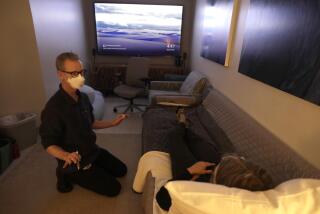Woman-Surgeon Privacy Seen as Victim in Debate Over Silicone Breast Implants : Health: If the FDA approves panel’s proposal, those seeking the devices would be part of research program, complete with monitoring procedures.
- Share via
WASHINGTON — Amid the confusion that prevailed Friday, one day after a federal advisory panel recommended severe restrictions on the use of silicone gel breast implants, one thing emerged as a virtual certainty: The decision to obtain these implants no longer will be a private one between a woman and her surgeon.
If the Food and Drug Administration approves the committee’s proposal--as it is expected to do--nearly every woman who wants a silicone gel implant will become part of a huge research program and be subject to some kind of monitoring.
“You’ll probably have to agree to be accessible for further questions and tests,” said Dr. Scott Spear, a plastic surgeon at Georgetown University Hospital. “And you may lose at least some of your privacy.”
Under the recommendation made Thursday, women seeking the controversial devices for cosmetic reasons--usually breast enlargement--would have limited access as part of carefully controlled scientific studies.
The panel said, however, that all women who need the implants for reconstruction purposes should have them, although they too would become part of a research program.
Women who seek silicone implants for augmentation, in particular, likely would be required to go through rigorous screening before obtaining them. First, they would have to find a physician involved in a clinical study of the devices. Then, they would have to meet the specific requirements demanded of that trial.
Such eligibility “will depend on what the scientists want to look at and the scientific questions that have to be asked,” said Deputy FDA Commissioner Carol Scheman. These have yet to be determined, although federal health officials probably will “have something to say in shaping what kinds of scientific questions would have to be answered,” she said.
Also, she said, the number of women eligible to participate in the research “will be determined by the nature and number of questions being asked.”
In general, the panel said that more research is needed to determine the frequency and the health consequences of implant rupture--particularly “silent” rupture, in which there are no symptoms--as well as “gel bleed,” which is slow leakage of the silicone through the envelope that surrounds the implant.
Furthermore, critical unresolved questions remain about the tentative link between silicone and autoimmune diseases, including certain connective tissue disorders.
Every study must be approved by a so-called institutional review board, a local panel typically within the facility that conducts the research. Such boards examine the study design and the way in which it will be run. Furthermore, women will be required to sign an informed consent agreement and agree to be monitored for however long the research takes.
Women seeking the devices for reconstruction will have an easier time, because it is unlikely that they will be denied an implant.
In any event, it may be awhile before the silicone gel implants become available again to anyone. Saline implants have not been restricted. Women wanting the gel implants, of course, still can go to other countries that permit the operations. Britain refused this month to restrict them.
“Women are calling me today and asking if they will now be able to get silicone implants, and I am telling them: I don’t know. I don’t think anyone knows,” said Dr. Neal Handel, associate medical director of the Breast Center in Van Nuys. “People are still waiting for the dust to settle. And it still hasn’t settled.”
FDA Commissioner David A. Kessler has promised to decide within 60 days whether to accept the panel’s recommendations. Until then, the moratorium on silicone gel implants he sought Jan. 6 will remain in place.
After that, it could take months--and probably longer--before studies are designed, reviewed, approved and put in place. Research can be proposed and funded by the implant manufacturers, academic institutions and the National Institutes of Health, which almost certainly will be involved on many levels. All such studies must be approved by the FDA.
“We haven’t begun to meet to hash out the specifics of this,” said Ruth Merkatz, special assistant to Kessler for women’s health issues. “It will take quite some time to get all this organized.”
Some efforts probably will be made, however, to speed up access for breast cancer patients who were on the brink of undergoing reconstruction when the moratorium was called. “We certainly hope we will get the wheels going faster for them,” Merkatz said.
Merkatz said that a special FDA toll-free hot line to answer questions from the public on implants had received 7,000 calls during its first 24 hours of operation, mostly from women who already have the devices and are worried about their risks.
The most frequently asked question has been: “How can I tell if my implant has ruptured?” Merkatz said. “We are telling them there is a range of symptoms, the most noticeable being any changes in the breast contour and sensation, and that symptoms vary from woman to woman.”
Merkatz urged all women with silicone implants who are worried to discuss their concerns with their physicians and advised them “to have regular medical follow-up for as long as their implants are in place. What we heard repeatedly during the hearings is that women are not returning for follow-up.”
Follow-up checkups will be required, if the panel’s recommendation is approved. Nevertheless, Merkatz said, “we’re as much concerned about all those women who have implants as we are about those who will have them in the future.”






